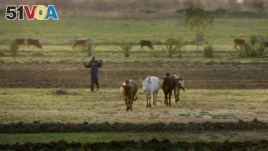24 September, 2017
When she woke up one morning in February, Catherine Kagendo saw one of her cows on the ground.
"It was lying on its side ... and was breathing heavily," she said.
Kagendo spoke to the Reuters news agency from her farm in eastern Kenya.

FILE - A farmer herds his cattle at sunset near Kisumu, Kenya, Feb. 2, 2008. (AP Photo)
She and her husband decided to seek advice from WeFarm, a group of farmers who exchange text messages. They sent a text to the group. Within an hour, she received suggestions on how to help the milk cow.
"Feed your cow with minerals rich in calcium," one farmer wrote. Another farmer urged Kagendo to make sure the shelter for the animal stays dry and clean.
"I learned that our cow had milk fever, so I gave it calcium-rich feed and it was standing again within hours," Kagendo said.
She is one of many Kenyans who operate a small farm in the countryside. Small-scale farmers often lack good information on how to deal with problems from dry weather to treating diseases. Local farming experts say a lack of internet service is an issue in some areas.
The WeFarm network lets people ask a question by texting and receiving answers from other farmers.
Kenny Ewan of Scotland helped to set up the network in Kenya in 2014. He describes it as "the internet for people who do not have the internet." The service is free to use and only requires a mobile phone.
Farmers send a text message with their question to a local telephone number. WeFarm sends the question to other farmers in the area.
"We want farmers to get answers to their problems without needing access to the internet," said Mwinyi Bwika, who works for WeFarm.
Information levels
Kagendo said before, when her animals got sick, she used to pay an agricultural expert to help her.
"But we had to pay a fee ranging from 500 to 2,000 Kenyan shillings, and most of the time the officer did not even explain his diagnosis," she said.
That cut into her farm's earnings and left her no better able to understand the diseases facing their cattle and crops.
Bwika said small-scale farmers often lack the information they need because they have poor internet service and little money to spend. Most farmers live on one dollar a day.
Farmer Joseph Kinyua grows vegetables in Meru. Kinyua says he uses WeFarm at least 30 minutes each day. He says other farmers have taught him a lot of things, from protecting his crops to improving his watering system.
The answers from WeFarm have helped improve the quality of the kale he grows, Kinyua said. "Now I can sell a kilo of kale at the market for 70 shillings instead of 50 shillings."
Preventing problems
When WeFarm receives many answers to a single question, it only sends the user the answers that appear to be correct.
WeFarm also uses the information it collects to follow diseases and threats from extreme weather. It shares the information with government officials and non-governmental organizations.
But not everyone likes WeFarm.
Farmer Mary Nkatha said it was difficult to act on some of the suggestions without an expert to help her.
"If I am told to inject my cow with something, how do I make sure I do it in the right place," she asked. "Where do I find the equipment?"
Frederick Ochido is a Kenyan-based expert on dairy farming. He worries that WeFarm may enable farmers to avoid technology instead of helping them.
The text-based network has over 100,000 users in Kenya, Uganda and Peru. Its operators hope to expand the effort to other countries.
I'm Susan Shand.
The Reuters news agency reported this story. Susan Shand adapted the report for Learning English. George Grow was the editor.
Write to us in the Comments Section or on 51VOA.COM.
_______________________________________________________________
Words in This Story
mobile – adj. something with the ability to move
access – n. permission or ability to do something
ranging – v. to come with set limits
diagnosis – n. the act of identifying a disease